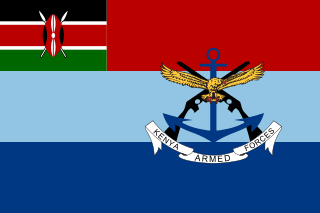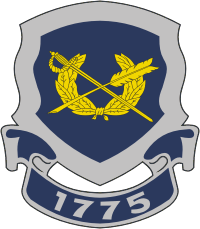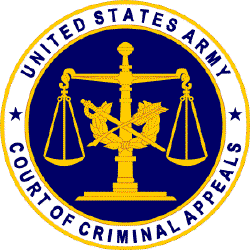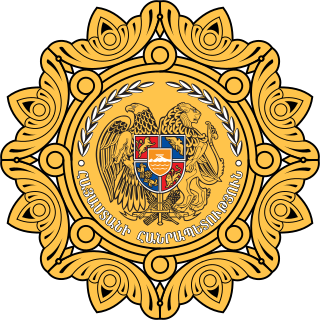
The Kenya Defence Forces (KDF) are the armed forces of the Republic of Kenya. They are made up of the Kenya Army, Kenya Navy, and Kenya Air Force. The current KDF was established, and its composition stipulated, in Article 241 of the 2010 Constitution of Kenya; it is governed by the KDF Act of 2012. Its main mission is the defence and protection of the sovereignty and territorial integrity of Kenya, recruitment to the KDF is done on yearly basis. The President of Kenya is the commander-in-chief of the KDF, and the Chief of Defence Forces is the highest-ranking military officer, and the principal military adviser to the President of Kenya.
A court-martial or court martial is a military court or a trial conducted in such a court. A court-martial is empowered to determine the guilt of members of the armed forces subject to military law, and, if the defendant is found guilty, to decide upon punishment. In addition, courts-martial may be used to try prisoners of war for war crimes. The Geneva Conventions require that POWs who are on trial for war crimes be subject to the same procedures as would be the holding military's own forces. Finally, courts-martial can be convened for other purposes, such as dealing with violations of martial law, and can involve civilian defendants.
The Uniform Code of Military Justice (UCMJ) is the foundation of the system of military justice of the armed forces of the United States. The UCMJ was established by the United States Congress in accordance with their constitutional authority, per Article I Section 8 of the U.S. Constitution, which provides that "The Congress shall have Power. .. to make Rules for the Government and Regulation of the land and naval forces" of the United States.
In the United Kingdom, the Judge Advocate General is a judge responsible for the Court Martial process within the Royal Navy, British Army and Royal Air Force. As such the post has existed since 2006; prior to this date the Judge Advocate General's authority related to the Army and the RAF while the Judge Advocate of the Fleet was the equivalent with regard to the Royal Navy.

The United States Court of Appeals for the Armed Forces is an Article I court that exercises worldwide appellate jurisdiction over members of the United States Armed Forces on active duty and other persons subject to the Uniform Code of Military Justice. The court is composed of five civilian judges appointed for 15-year terms by the president of the United States with the advice and consent of the United States Senate. The court reviews decisions from the intermediate appellate courts of the services: the Army Court of Criminal Appeals, the Navy-Marine Corps Court of Criminal Appeals, the Coast Guard Court of Criminal Appeals, and the Air Force Court of Criminal Appeals.
The Court Martial Appeal Court of Canada (CMAC) hears appeals from Courts-martial of Canada.
An Article 32 hearing is a proceeding under the United States Uniform Code of Military Justice, similar to that of a preliminary hearing in civilian law. Its name is derived from UCMJ section VII Article 32, which mandates the hearing.

Courts-martial of the United States are trials conducted by the U.S. military or by state militaries. Most commonly, courts-martial are convened to try members of the U.S. military for violations of the Uniform Code of Military Justice (UCMJ). They can also be convened for other purposes, including military tribunals and the enforcement of martial law in an occupied territory. Federal courts-martial are governed by the rules of procedure and evidence laid out in the Manual for Courts-Martial, which contains the Rules for Courts-Martial (RCM), Military Rules of Evidence, and other guidance. State courts-martial are governed according to the laws of the state concerned. The American Bar Association has issued a Model State Code of Military Justice, which has influenced the relevant laws and procedures in some states.

The Judge Advocate General's Corps of the United States Army, also known as the U.S. Army JAG Corps, is the legal arm of the United States Army. It is composed of Army officers who are also lawyers and who provide legal services to the Army at all levels of command, and also includes legal administrator warrant officers, paralegal noncommissioned officers and junior enlisted personnel, and civilian employees.
A United States military "jury" serves a function similar to an American civilian jury, but with several notable differences. Only a general court-martial or special court-martial includes members. There are no members in a trial by summary court-martial. If the defendant at a general or special court-martial chooses to be tried by members rather than by a military judge alone, the members are responsible for rendering both a verdict and sentence should the accused be found guilty. The charges are brought forward by an officer called a "convening authority", who also selects the members who try the accused. The charges are prosecuted by judge advocates called "trial counsel". Defendants facing general or special courts-martial are represented free of charge from judge advocates acting as defense counsel. Defendants may also be represented at general or special courts-martial by civilian attorneys hired at their own expense. While not required by Congressional law, service policy provides that, at summary courts-martial, many military accused receive representation from a judge advocate defense counsel free of charge.

Ehren Keoni Watada is a former first lieutenant of the United States Army, best known as the first commissioned officer in the US armed forces to refuse to deploy to Iraq. In June 2006, Watada refused to deploy for his unit's assigned rotation to Operation Iraqi Freedom, saying he believed the war to be illegal and that, under the doctrine of command responsibility, it would make him party to war crimes. At the time, he was assigned to duty with the 5th Battalion, 20th Infantry Regiment, part of the 3rd Brigade, 2nd Infantry Division, as a fire support officer. He was brought before a court-martial in 2007 which ended in a mistrial; the Army subsequently discharged him under "Other-Than-Honorable-Conditions" (OTH) in 2009. An OTH discharge is the least favorable type of administrative discharge from the Army, and is reserved for a "pattern of behavior that constitutes a significant departure from the conduct expected of Soldiers of the Army."
The Navy-Marine Corps Court of Criminal Appeals (NMCCA) is the intermediate appellate court for criminal convictions in the United States Navy and the Marine Corps.

In the United States military, the Army Court of Criminal Appeals (ACCA) is an appellate court that reviews certain court martial convictions of Army personnel.

The Government of the Republic of Kenya (GoK) is the national government of the Republic of Kenya, a federal republic located in East Africa, composed of 47 Counties, each county with its own semi-autonomous governments, including the national capital of Nairobi, where the national government is primarily based.

The military courts of the United Kingdom are governed by the Armed Forces Act 2006. The system set up under the Act applies to all three armed services: the Royal Navy (RN), the British Army, and the Royal Air Force (RAF), and replaces the three parallel systems that were previously in existence.
In United States military law, a convening authority is an individual with certain legal powers granted under either the Uniform Code of Military Justice or the Military Commissions Act of 2009.
The Judge Advocate General's Corps, also known as JAG or JAG Corps, is the military justice branch or specialty of the United States Air Force, Army, Coast Guard, Marine Corps, and Navy. Officers serving in the JAG Corps are typically called judge advocates.

The Judiciary of Kenya is the system of courts that interprets and applies the law in Kenya. After the promulgation of the Constitution of Kenya in 2010, the general public, through parliament, sought to reform the judiciary. Parliament passed the Magistrates and Judges Vetting Act of 2011. A major part of reforming the judiciary was the vetting of Magistrates and Judges in an attempt to weed out unsuitable ones. The Judicature Act has also been amended to raise the minimum number of Magistrates and Judges allowing more judicial officers to be hired. More magistrates and judges are needed to clear the backlog of cases that have caused great delay in the conclusion of cases and to staff new courts. New courts are needed to bring the courts closer to the people which is in line with devolution, a major principle written into the Constitution of 2010. New courts like the High Court opened in Garissa in November 2014 is a good example. In the past residents of North Eastern Kenya had to go all the way to Embu to access a High Court.

The president of Armenia is the head of state and the guarantor of independence and territorial integrity of Armenia elected to a single seven-year term by the National Assembly of Armenia. Under Armenia's parliamentary system, the president is simply a figurehead and holds ceremonial duties, with most of the political power vested in the parliament and prime minister.
Courts martial of Canada are trials conducted by the Canadian Armed Forces. Such courts martial are authorized under the National Defence Act. Civilians with a military unit also become subject to the courts-martial system.









